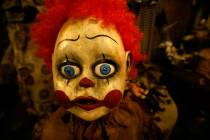Do hard times mean laughter — or tears?
Michael Green isn't a producer. But if he were, he knows exactly what marching orders he would give to his writers and directors over the next few months.
"Be funny," Green says. "Make me laugh."
That's because Green, a history professor at the College of Southern Nevada, figures that the country's economic troubles may put American consumers into an escapist frame of mind this year.
It could be true: American popular entertainment may well be hijacked by the musicals, comedies and other escapist-oriented offerings like those favored during the Great Depression.
On the other hand, Americans may sail through the current recession preferring much the same entertainment -- comedies, reality shows, game shows -- they're watching now.
It's difficult to predict if or how the recession will make itself visible on stages, movie screens and TVs. But Green suspects comedies and lighter fare could serve the same escapist function they offered out-of-work, financially fearful Americans of the '30s.
However, Robert Thompson says the Great Depression offers a less definitive, more multicolored template than many imagine.
"I think we've got to be real careful when we start thinking good economic times means X-type of programming, and bad economic times means Y-type of programming," says Thompson, director of the Bleier Center for Television and Popular Culture at Syracuse University.
The Depression was a time of lavish musicals, but also of gangster movies, dark thrillers and dramas that dealt explicitly with Depression-era themes. And, while the popular comedies and fluffy bits of escapism most associate with Depression-era popular entertainment did help filmgoers and playgoers forget their troubles for a few hours, "the fact is, people generally like escapist programs when there are good times and when there are bad times," Thompson says.
"My feeling on this is: When there's a lot of bread, we demand circuses. When there's no bread, we also demand circuses. The fact is, we like circuses."
Walter Niejadlik, board president of Las Vegas Little Theatre, says the company is leaning toward producing a slate of comedies next season. He notes that comedies worked well for the group this season, and expects playgoers will be ready for even more lighter, humorous offerings come fall.
The state of the world always influences the composition of a theater season, Niejadlik says. And with Southern Nevada suffering a surfeit of bad news, "my feeling right now is, people want to see comedies and, at least, not anything that's going to be too heavy."
Dramas won't be completely forsaken, of course. For example, the Fischer Black Box Theatre will continue to be home to the company's adventurous, more avant-garde offerings, he says.
But, on the main stage, "unless there's some major change in the economy real soon, I think people probably are still going to be leaning toward comedies," Niejadlik says.
Robert Brewer, artistic director of Nevada Conservatory Theatre, says that the state of the world "always plays a part" in crafting a new theater season.
"At least with me it does," he continues. "I'm always reading headlines more than I do scripts. I want to see, what are we mirroring, what's important, what's the reason to do this play?"
But, Brewer adds, "I have never been one to do a formula season: When things are down, we're going to make everybody laugh. You're just shooting yourself in the foot to do that."
The current flailing economy has prompted Brewer to take a look at Depression-era plays and dramas with Depression-era themes such as "The Grapes of Wrath."
"To look at another era might be interesting," he explains. "We're talking about 'The Time of Your Life,' which also takes place in the Depression."
And, he says, "of course, we're talking about comedies, but we talk about comedies all the time."
College of Southern Nevada theater professor Doug Baker wouldn't be surprised if local theatrical offerings over the next year or so do take a look, even if an oblique one, at recession-type themes.
For example, the college next season will stage a production of "The Madwoman of Chaillot" by Jean Giraudoux, which examines class differences and "what greed and the rise of capitalism has done," Baker notes. Right now, he explains, "it just seems like a good piece to do."
In addition, Baker says the college is taking a look at modern American dramas that may "speak to what's happening today," whether overtly or thematically.
"We always try to do something that's pertinent," he says, and while the college's audiences do "want to be entertained ... we also, as a college, feel we have to try to challenge."
Contact reporter John Przybys at jprzybys@reviewjournal.com or 702-383-0280.




























